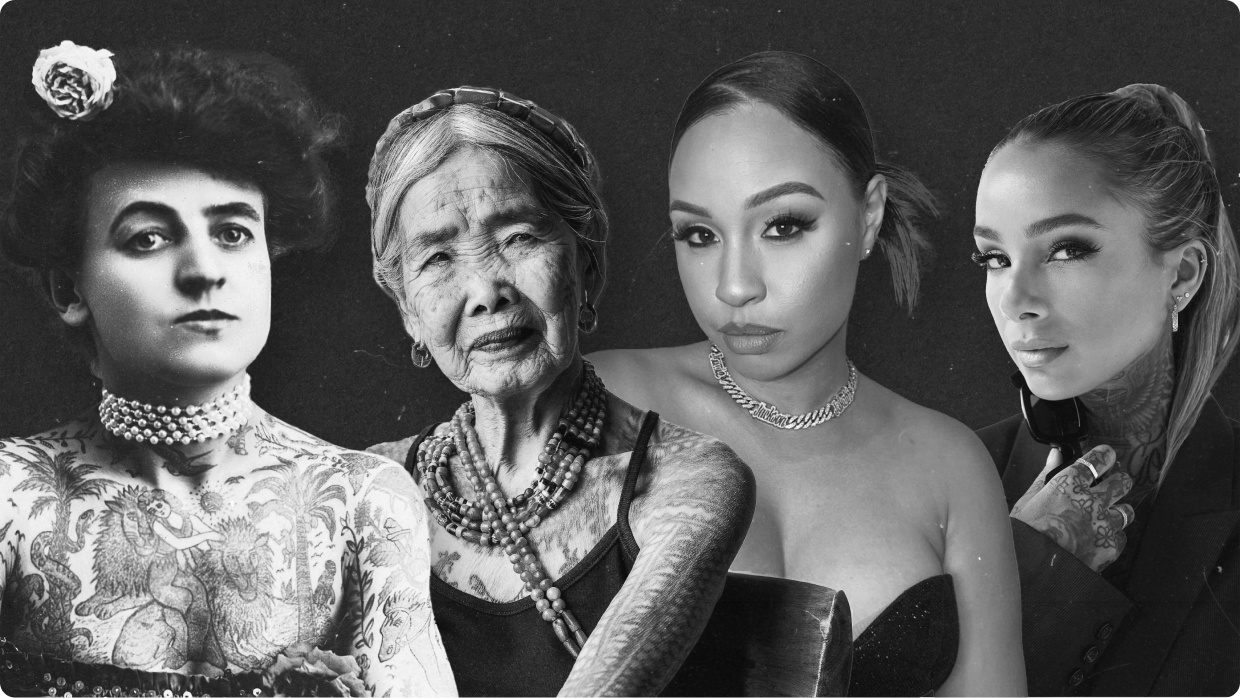Tattooing as an art form has a rich history spanning millennia, with women playing a significant, albeit overlooked, role. From ancient rituals to contemporary parlors, women have left their mark on the art and industry despite facing substantial challenges along the way.
According to Pew Research Center, 38% of women have at least one tattoo, compared with 27% of men. This includes 56% of women ages 18 to 29 and 53% of women ages 30 to 49. With this fact in mind, we aim to explore the historical significance and societal perception of women within the realm of tattoo culture – from ancient societies all the way to modern times.
This article explores women from ancient civilizations, highlights some of the influential female figures in the modern industry, and ends with a conversation with renowned artists Cleo Peétra and Kat Tat, facilitated by co-founder of CO:CREATE Tara Fung – three women deeply ingrained in the modern world of tattooing. They discuss their unique paths into the traditionally male dominated industry as well as advice for aspiring women tattoo artists. Be sure to view the full interview here with the video and full transcript at the bottom of this article.
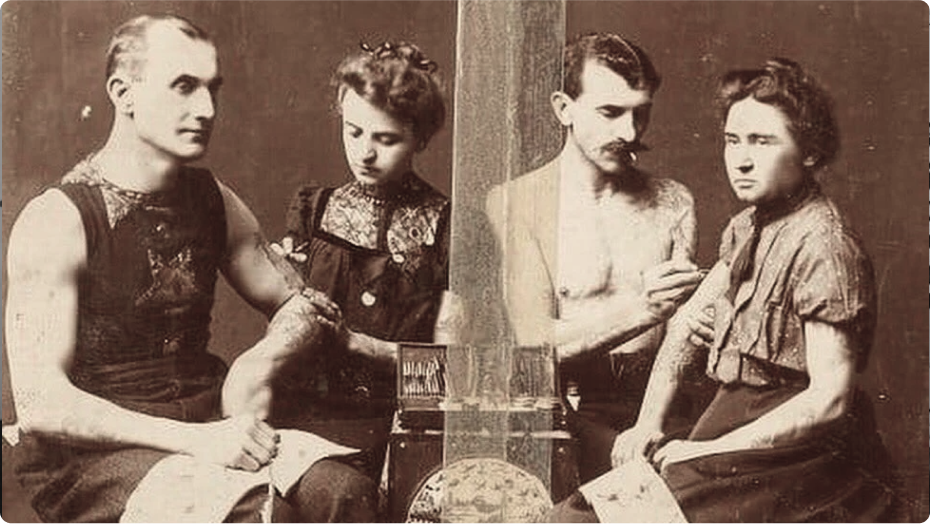
Ancient Female Tattoos
Ancient societies provide evidence of women's involvement in tattooing practices. For example, the Berber women of Morocco practiced tattooing as a cultural tradition, utilizing intricate geometric patterns to symbolize various aspects of identity and heritage.
In ancient Egypt, women would receive tattoos, often depicting symbols of fertility and protection during childbirth. Archaeologists exploring the ancient town of Deir el-Medina near the Nile River unearthed evidence of tattoos dating back to 1550-1070 BC. Two female mummies revealed intricate designs symbolizing protection during childbirth. One mummy displayed tattoos depicting a bowl, purification ritual, and Bes, the Egyptian deity safeguarding women and children. The second mummy, studied with infrared photography, showcased a wedjat (Eye of Horus) and Bes wearing a feathered crown, alongside a zigzag line representing a marsh for pain relief.
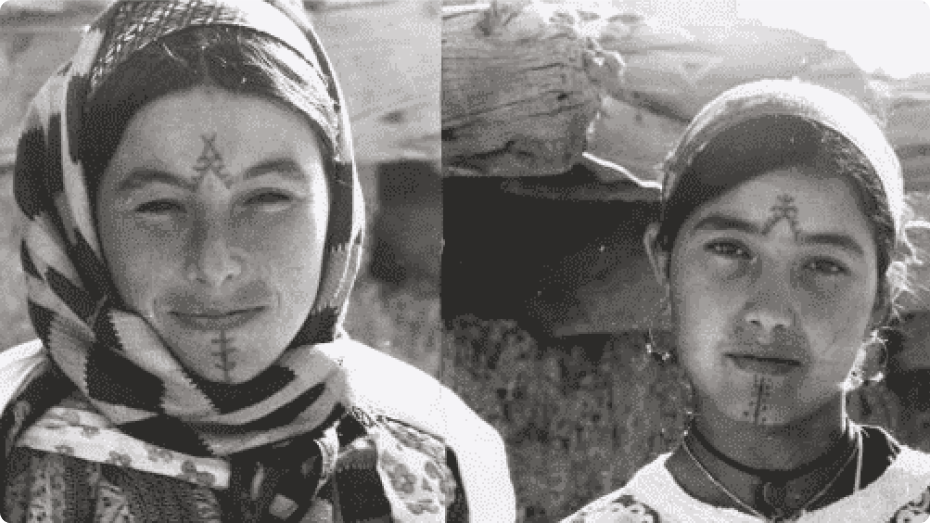
Berber Women

Deir El-Madina
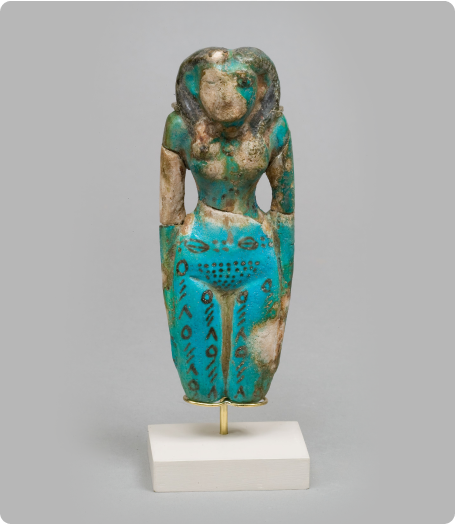
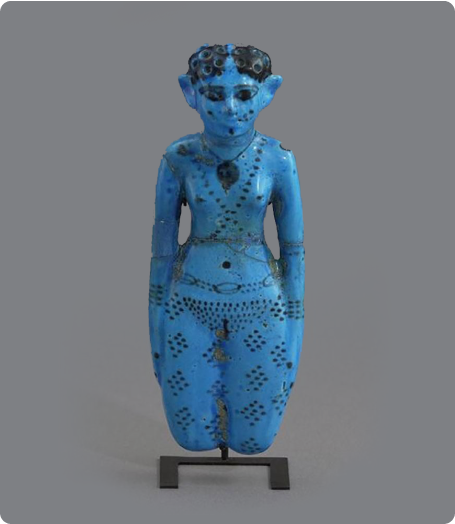
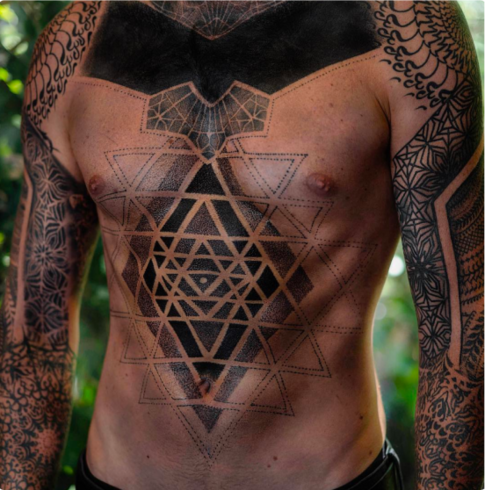


The Pazyryk culture of ancient Siberia practiced tattooing as early as the 4th century BCE, with both men and women sporting intricate designs. Discovered in the Ukok Plateau of Siberia, the "Altai Maiden," or Princess Ukok, is a mummy dating back over 2,500 years. Remarkably preserved, her body revealed intricate tattoos depicting animals, mythical creatures, and symbols. These tattoos are believed to hold spiritual significance providing insight into ancient Siberian beliefs and culture. As one of the oldest and most well-preserved tattooed individuals in history, she continues to fascinate researchers and enthusiasts, shedding light on ancient Siberian traditions.
In some areas of the world, such as parts of Nepal, tattooing was something reserved exclusively for women. Having a tattoo as a male was considered laughable.
These are only a few examples of female tattoos across ancient cultures. Further archeological studios have found female tattoos across Polynesian and Melanesian cultures in the Pacific Islands, Celtic tattoos in the Iron Age, nomadic peoples inhabiting parts of present-day Russia and Ukraine, and many more.
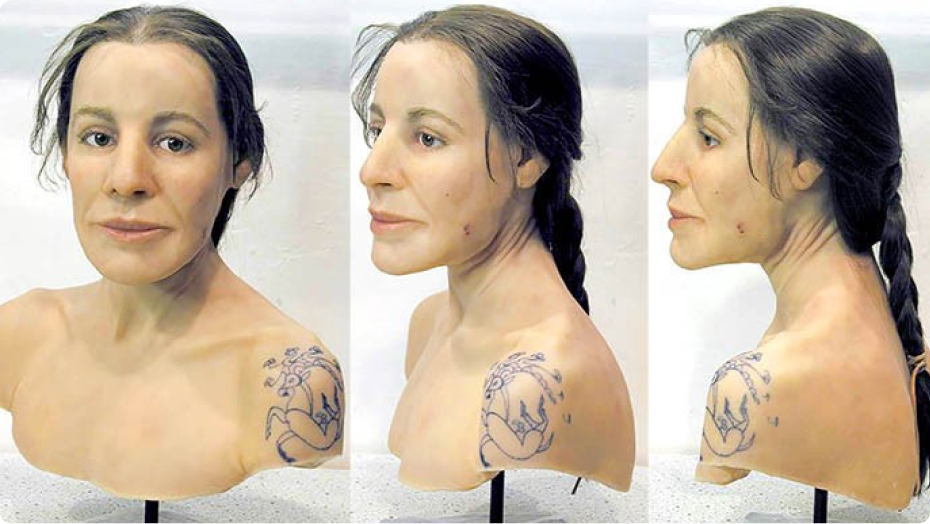
Recreation of Siberian Ice Maiden

A Shift During the The Victorian Era
The Victorian era marked a significant transition for the tattoo industry, as societal perceptions shifted, leading to its association with sailors and societal outcasts. During this period, tattoos became emblematic of rebellion and nonconformity, challenging Victorian norms of respectability and modesty. As a result, the tattooing profession became increasingly male-dominated, with sailors and working-class men comprising the majority of practitioners.
The rise of British maritime power during the Victorian era fostered the proliferation of tattoos among sailors, who adorned their bodies with nautical symbols, patriotic imagery, and mementos of their voyages. However, this association with sailors contributed to the marginalization of tattooing as a profession, further stigmatizing those involved in the industry.
Simultaneously, tattoos gained popularity among marginalized groups, including criminals, circus performers, and members of the lower classes. These individuals, often excluded from mainstream society, embraced tattoos as a means of self-expression and defiance against societal norms. The tattoo parlor became a refuge for those on the fringes of society, providing a space for self-identification and solidarity within marginalized communities.
Amidst this male-dominated landscape, pioneering women like Maud Wagner emerged as trailblazers, challenging gender norms and reshaping the tattooing industry. Wagner, a circus performer and contortionist, became the first documented female tattoo artist in the United States during the late 19th century. She learned the craft from her husband, Gus Wagner, a prominent tattoo artist at the time.
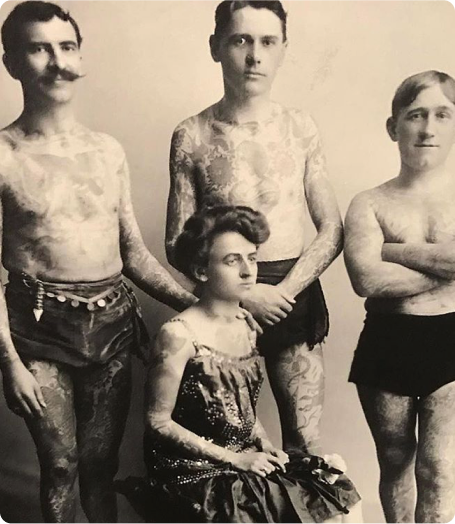
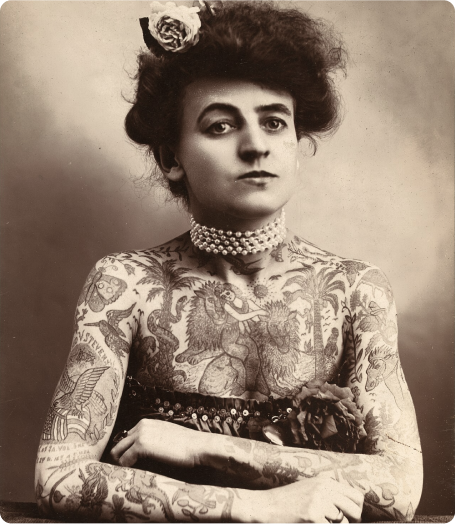
Wagner's success challenged the prevailing notion that tattooing was exclusively a man's domain, inspiring other women to enter the industry and assert their presence. Although women tattoo artists faced significant hurdles and discrimination, pioneers like Maud Wagner paved the way for future generations of women to pursue careers in tattooing. Their resilience and determination challenged the status quo, opening doors for women to contribute to and shape the evolving landscape of the tattoo industry.
Moving into the 20th Century
Throughout the 20th century, women continued to assert themselves in the tattoo industry, albeit against significant odds. The feminist movement of the 1960s and 70s provided a platform for women to reclaim their bodies as sites of autonomy and self-expression, leading to a resurgence of interest in tattooing among women. However, gender biases persisted within the industry, with women tattoo artists often struggling for recognition and respect in a male-dominated field.
The 20th century saw some incredible women break the mold and defy stereotypes of the tattoo world. The following is a shortlist of women who made a name for themselves in the world of tattooing, despite the gender biases rooted deeply within the industry.
Jessie Night, hailed as the UK's first female tattooist, began her craft in 1921 at age 17. She took over her fathers shop in Barry, south Wales, she faced the stigma that most women tattoo artists did at the time. She countered it with a suit and impeccable grooming. Despite derogatory labels, she persisted, tattooing until the 1980s and managing multiple shops.
Mildred Hull (aka Millie), a former burlesque dancer, was one of the first women to learn tattooing without the help of a boyfriend or husband. In 1943, she was referred to as New York's only female tattooist despite the fact that tattooing was illegal in NYC until 1997.
Jacci Gresham, recognized as the first Black female tattoo artist in the US, emerged as an icon in 1972. Breaking into a predominantly white and male-dominated industry, she opened Aart Accent Tattoos in New Orleans, marking the first establishment by a Black woman in the US. Now in her 70s, Jacci continues to tattoo, embodying resilience and creativity.
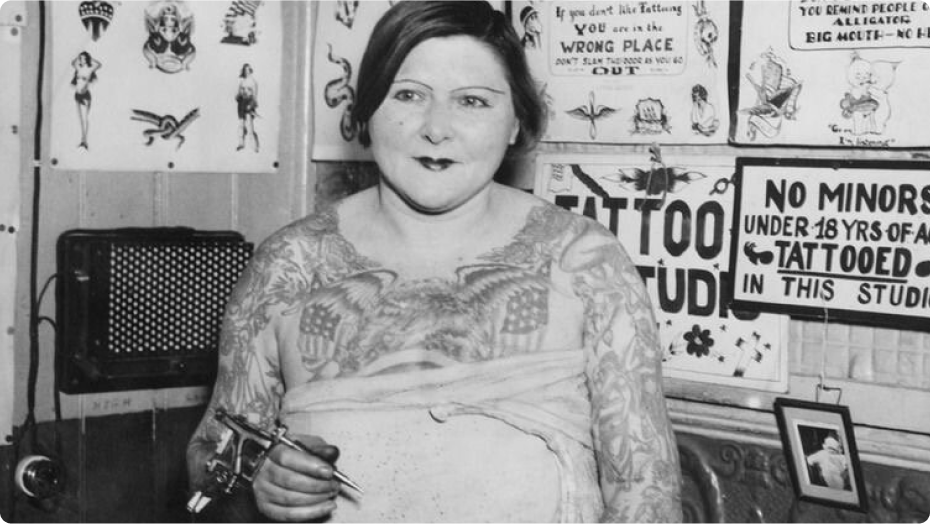
Mildred Hull (aka Millie)
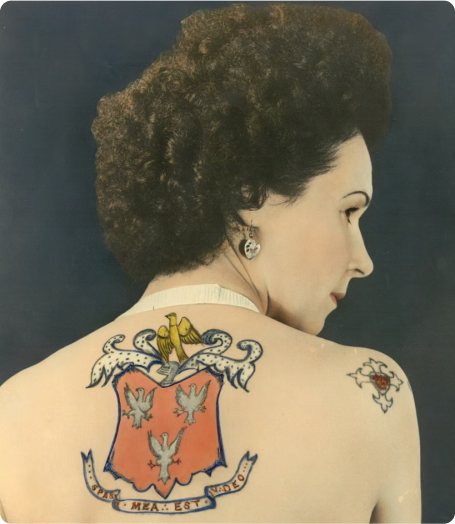
Jessie Night
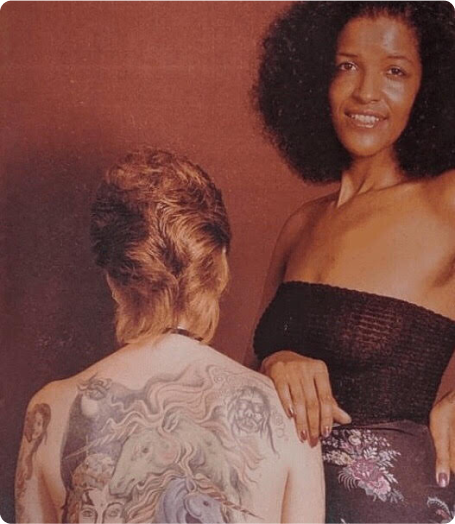
Jacci Gresham
Betty Broadbent, who apart from performing in the circus, worked as a tattoo artist, traveling across countries like Montreal, San Francisco, and New York. She was the first inductee into the Tattoo Hall of fame in 1981. She is regarded as the most photographed tattooed lady of the 20th century.
Whang-od, also known as Maria Oggay, is the last and oldest practitioner of Kalinga tattooing. At the age of 15, she began tattooing Butbut headhunters who traditionally earned tattoos from deeds in combat. Whang-od continues to practice traditional tattooing on tourists visiting Buscalan and interestingly is the oldest person to feature on the cover of Vogue.
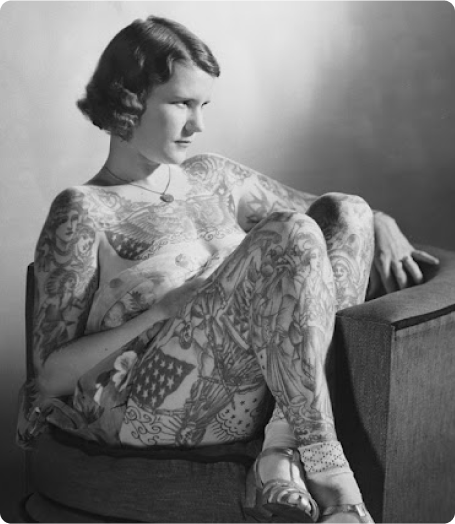
Betty Broadbent
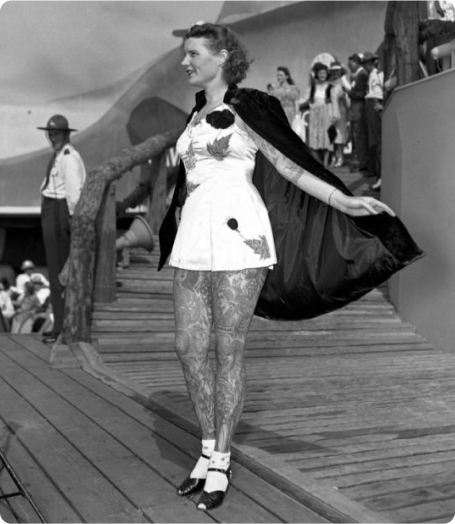
Betty Broadbent
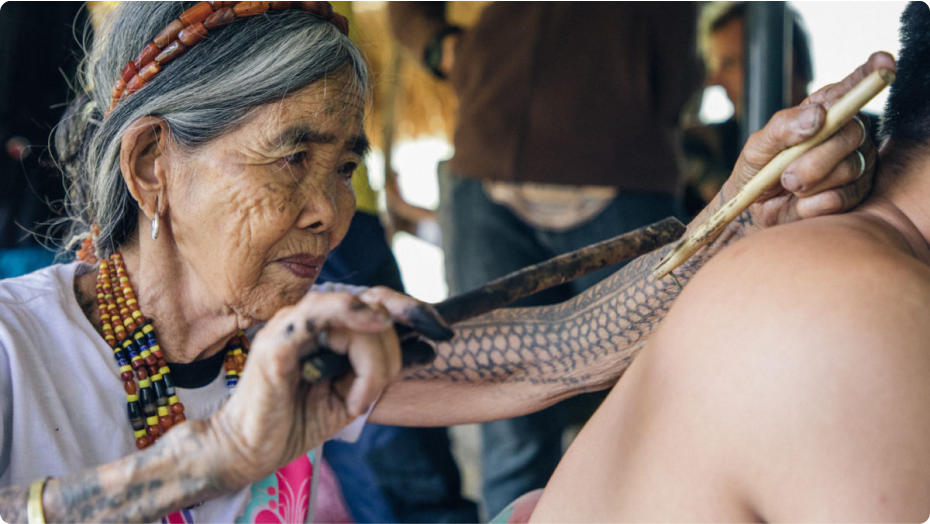
Whang-od
The 21st Century – Modern Era
The 21st century has seen a notable increase in the visibility and influence of women in the tattoo industry. Female artists like Kat Von D and Megan Massacre have achieved widespread acclaim, challenging stereotypes and reshaping perceptions of tattooing as a male-dominated art form. Today, women represent a significant portion of the tattoo artist population, with an estimated 30% of professional tattoo artists in the United States being female. Despite these advancements, there are still plenty of instances indicating women in the industry continue to face challenges related to gender bias and discrimination.
In conclusion, the history of women in the tattoo industry is one of resilience and perseverance in the face of adversity. From ancient cultural practices to modern-day studios, women have played a crucial role in shaping the evolution of tattooing as an art form. We are exploring the experience of women tattooers through the lens of CO:CREATE Founding Artists Cleo Pétra, Kat Tat, and Moni Marino.
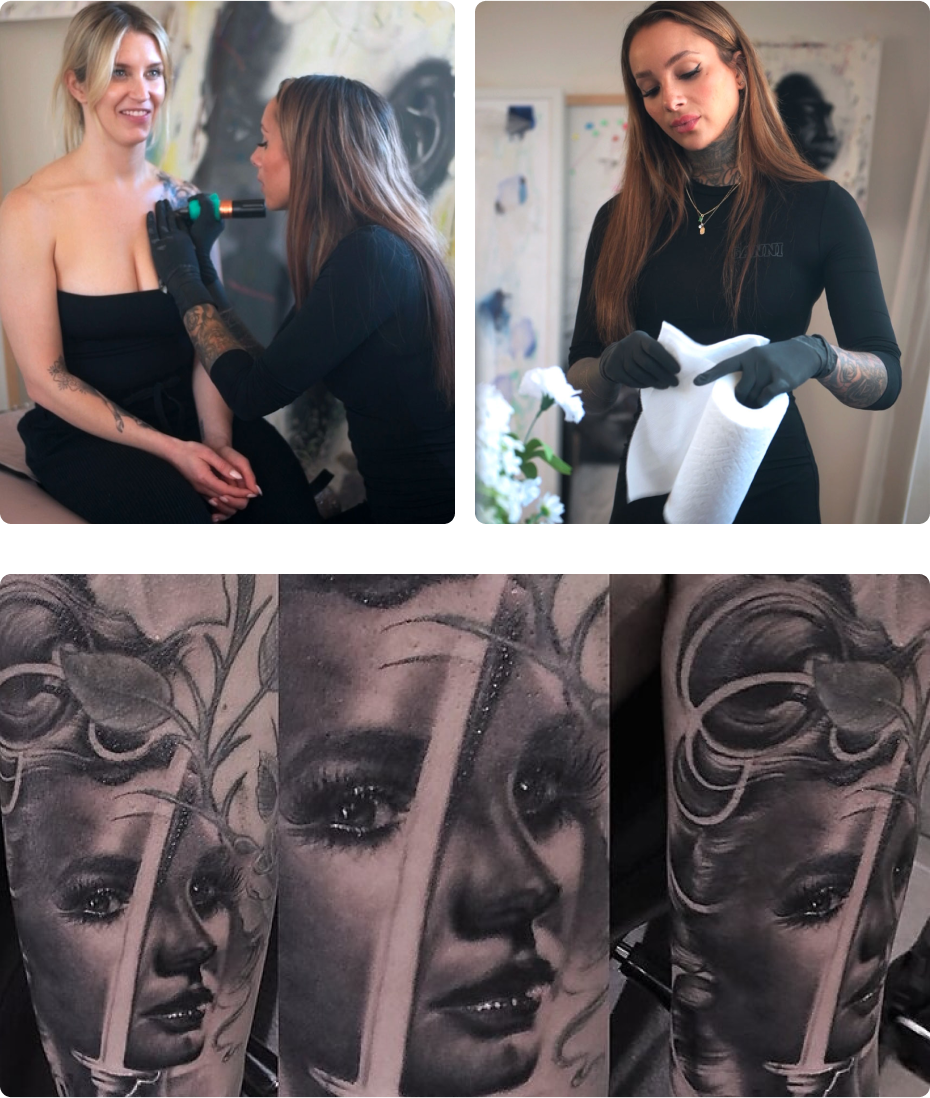
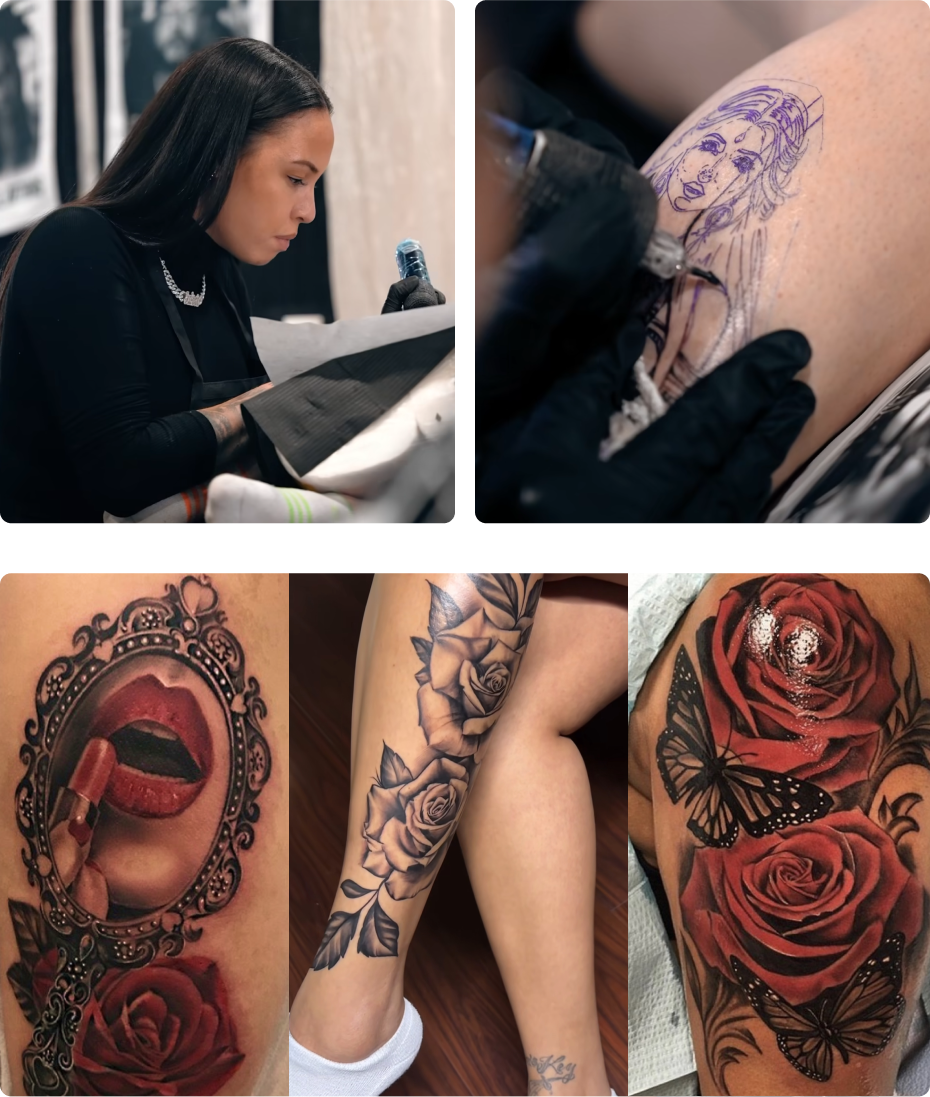
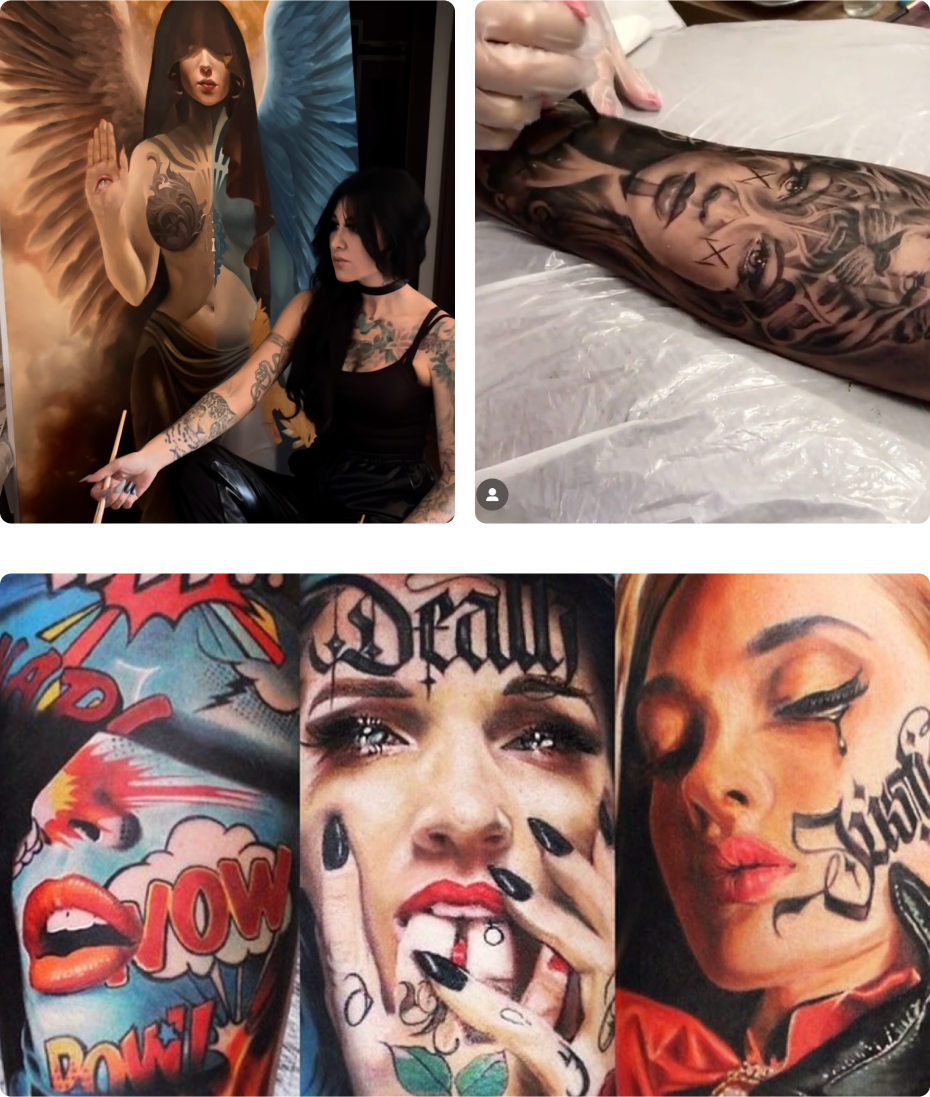
Moni Marino
Tara Fung, CO:CREATE Co-Founder, sat down with Kat Tat and Cleo to discuss this very topic and understand their experiences. Watch the interview and find the full transcript below.
Tara
All right. Well, Kat, Tat, Cleo, thank you all both so much for making time to chat with us today. As part of Women's History Month, we wanted to feature some of the amazing women artists here on CO:CREATE Ink. To get us started, have an easy one for you. What drew you into tattooing and can you describe a little bit your journey into the industry? So maybe Kat, Tat, let's start with you. Although I bet a lot of people know your history given some of the features you've been on?
Kat
So for me, it was, I got my first tattoo when I was 16 in someone's basement. And I felt like around that age, all my friends, everybody just started getting them. So I used to be in art class. I used to carry my big art portfolio around. I was like the art girl. So people just started like having me draw their tattoos. So when I got my first tattoo, I drew my own. And I remember the artist was like, this design is really good. You should try it. So that is what got my interest, just being the girl that drew all my friends' tattoos for them. And then when I got my first one, it was like, OK, I'm going to be getting tattooed. So I just ordered up a kit from Worldwide Tattoo Supply and just started tattooing. But yeah, that's how my journey got started.
Tara
How about you, Cleo?
Cleo
This is still kind of a question I have to answer for myself, because I don't have as much of a clear answer as you do, Kat. For me, it was just I've always been artistic. I've always loved working with my hands, always been painting, drawing. And then I moved around a lot when I was younger. When I came to Sweden at the age of around 12, I was quite bored. with the school system there. And I couldn't see myself. I love learning. So it wasn't an issue about me being in school. I just couldn't really relate to teenagers' age and what they were doing and the way they were teaching there. So I started an apprenticeship, if you want to call that, at this very underground studio. It was basically in a cave.
Kat
Well, in my earlier years, like when I first started tattooing, like Cleo was one of the first. Like there weren't a lot of female tattoo artists, let alone that were like good.
Cleo
You remember me?
Kat
Yes, of course. But yeah, you were definitely one of the ones that was like, oh, I want, you know, to inspire me to really pursue this and, you know, take it seriously and show, you know, what you can make with it. And that was years ago. So since then, you know, just coming so far, you've just always been an inspiration to me. It's like y'all have both been people that each other has encouraged and inspired one another. And I think that's one of the things that was lacking for a long time within the the tattoo industry is there weren't a lot of visible women. And there are probably a lot of reasons for that.
Tara
I'm curious, what has your experience been overcoming some of what are probably challenges as a woman in this industry, particularly since both of you have been in the industry for over a decade?
Cleo
So for me, I guess I feel like I haven't faced a lot of those hurdles that I typically hear, the stories I typically hear from other women. Because I was surrounded maybe by such an amazing, powerful group of women early on. So I don't know if I have a good answer for that. I feel like I've always been a little bit of an outsider and made my way. So I just continued on that path.
Kat
It's so crazy how parallel that answer is with my story. Because I feel like mine was complete opposite. And you speaking about Tennille. And she was so friendly to me. Back in these years, like 2009, 2010, 2011, when I was first starting, being from Chicago, really the whole industry, it was just like pretty much male dominated. And it was very intimidating for me as a woman. And I would see all these women like you, Cleo. So now I remember I reached out to her years ago, and all these beautiful women doing these amazing tattoos. And it was such a great community that I felt like was so far away because I always knew I had it in. But I think a lot of guys in the industry, you know, they don't want to take you seriously or they might not pay much attention. I had to just, you know, mask who I was and just really prove to guys around me that I'm serious. Like, I really just do want a tattoo. You know, I felt like because I don't know, it was just like for me, it just made me feel like because I was a woman, I had to work twice as hard or hide my femininity to be taken seriously. So I just remember coming across, you know, like just women in the industry who were killing it that were just so far away from me and just like kind of, you know, letting that be my inspiration.
Tara
Yeah, and I'm curious, Kat, do you feel like that has evolved over time? Have you seen that change in the 15 years that you've been tattooing, the way women are perceived and maybe some of the internal biases that are often placed against women?
Kat
Yeah. I just remember feeling very intimidated. And now, like, I just got back from the Chicago convention and just, you know, 14, 15 years later, it's changed. Like, women have come and kicked down so many doors in this industry. I don't feel like, you know, there's, I think a lot of women have just been fearless in it and are just killing it. For me, having all brothers, like, I always wanted to prove that I could be just as good, you know, if not better than the boys. And I feel like there's a lot of women in this industry who don't see guys as a threat. they're not paying attention to that. They're just doing what they love and getting good at it. I mean, that's kind of like... I feel like I've been fearless, but the only reason it's worked is because I've had that attitude.
People have definitely talked some shit, but it's always been behind my back. Yeah. Which I don't care about anyway. But I'm sure if I would have been more vulnerable and susceptible to it, I'm sure I would have faced those issues more. But like I said, I was set up in a way where that wasn't really even on my mind, fortunately. So I feel really lucky about the women I've met, for example, early on.
Tara
Yeah. And I'm wondering, because you brought up that you experience this more in America, do you think getting your start in Sweden kind of set the stage for you, Cleo, to have a different experience than folks who might get their start in the U.S.?
Cleo
I think Sweden and also internationally because I traveled a lot. I only moved to America about nine years ago. So by then I kind of was established. I had been tattooing a while, traveled a lot. Also, the group of guys I was tattooing with in Sweden were five guys that are still some of my best friends who luckily, like I said, I've been pretty lucky. They've been nothing but supportive. They're like some of my fondest people. But like I said, in America, the vibe hasn't been the same. I also haven't worked in shops tattooing that much since I got here. Or like not since I got here, but the last maybe five years. So I don't really know what it's like in the same extent, to the same extent. And how about for folks starting out now? You know, I think it's a very different time and place.
Tara
For a lot of tattoo artists, they're struggling, male or female, they're struggling right now to get work. Do you have any advice for women tattoo artists in particular who are just starting out and trying to get their foothold in this industry?
Cleo
I would say just try to find what you're... It's a maybe cheesy answer, but find what you're passionate about and try to follow that. I think art... is sometimes, and for me, is sometimes tainted by just these formulas we have and these strict rules we have. And I feel like what what can make you stand out is kind of exploring and doing things that maybe aren't the norm. Like you see some people doing tattoos that look like stickers. Like I mean like literal stickers. Or some people doing stuff that looks like, or like paintings or black work. All these new kind of, or Korea has a crazy amount of artists that are doing all kinds of new styles that I've never seen before. So I guess leaning into your niche or whatever you're curious about exploring is helpful because there's so many amazing tattooers out there today. And I think standing out because there is something special in everyone that's learned how to technically tattoo. So if you can lean into whatever makes you unique, I think that could be helpful.
Kat
Yeah. And I would just say, you know, once you have that, like once you kind of like, you know, uh, not perfected, because you can always keep learning and growing in this industry. But once you've gotten good at it, I would just play to your strengths. You have to know how to, you can't be afraid to put yourself out there and kind of go with the times. I know a lot of tattoo artists are struggling right now because this industry has gotten so saturated. But now, back in the day, if I did a tattoo I was really, really proud of, I could just take a good picture of it and post it, and it would organically get me clients because people like it and they share it. And now it's like, you know, I roll my eyes at how much you have to do, like putting together reels and, and I complain about it. And I see a lot of my peers complaining about it, but the way I think about it is like when people, um, you know, when I started using rotary machines in like 2010, 2011, and like the old school tattooers gave me so much shit about it. Like, you know, and it's like, if you want to stay relevant and you know, you got to keep up with the times and now, you know, just use social media and those things to your advantage. You know what I mean? Like once you get good, don't be afraid to find creative ways to really put yourself out there.
Cleo
And that's what all is. They're ever changing. It's not just tattooing. No matter people, there's always a group of people that want to be victims. At the end of the day, we also can't, Kind of not talk about even client care or building relationships with your clients or even professionalism or being consistent, being on time. All those kind of things also matter. Just being a professional and being creative.
Those old school things combined with the things you said, Kat, I think is just a good formula for, you know, trying to have future work lined up for you.
Tara
Yeah. One of the things that I've noticed is that it seems like in the last decade, there has been this explosion. of new styles, new types of like tattoos visually, like it's just gone from being a set number of styles to really like you're seeing stuff pop up, as you were saying, Cleo, in South Korea, that just blows your mind. What do you think has changed in the last decade that has kind of allowed all of this to flourish?
Kat
I think for sure technology. I mean, I remember back in the day, like in order to design a tattoo, I don't know if you can relate to this, but I would have to print out so many pieces of paper, cut, literally tape my design together, hand trace it, push down, like just, and now you can literally like use apps like Procreate or other, you know, Photoshop like type apps and just put together crazy designs that, you know, the human hand or the human eye might not have been able to. You're able to literally do all that stuff. You're able to create your stencils way beforehand on these apps and running through the machine far before your client even gets there. And even the machinery, like it's not the heavy hitting coils, you know, you're not oozing blood like you were 10 years ago. Like you're able to do a lot more work um in a shorter period of time without putting a lot of that trauma on the skin.
Cleo
And seeing tattoos as well. Back in the day, it was hard to find even instagrams because i think instagram was just starting. you would have to find the tattooers you liked. And that was typically, at least for me, through the magazines. That was the only place you could see tattoos. There wasn't a ton of people walking. I mean, there were people with tattoos, but not in the same way there is today. And now there's pages with all kinds of tattooers. There's just a lot more availability as far as seeing different styles and all these things. There wasn't before.
Tara
Yeah, totally. So I have a question for you, Kat. You are a shop owner. You're a boss woman. You employ people at your shop. You have other artists there. You mentioned that when you started out, it was not the most inclusive inviting environment for women. How do you think as a shop owner as well, how do you think about creating an environment where anyone is able to come in and feel like they can succeed and do their best work?
Kat
I think I just, I remember, um, how that used to make me feel. I remember, you know, being, you know, not necessarily treated badly, but I remember people just intentionally trying to intimidate me and just do stuff that just was not in my character. So for me, opening up a shop, it wasn't even much about like, oh, I'm going to run my stuff this way. I'm going to do it this way.
It's just like, I am who I am. Like my background is my background. I've done so much research on the artists that were the founding five of my shop. I looked up to them. I was even scared to reach out to them. I don't know if I'm a passive person or whatever, but I was scared to reach out to them. I was asking, do you want to come to lunch with me? So for them to want to work with me, I was just honored. But it's not really my personality to make somebody feel less than. If I felt like someone wasn't good enough to, you know, work at my shop, but their art was really good, then, you know, now we can discuss an apprenticeship. It's not anything in my character to want to tear someone down. It's all about, you know, seeing if someone is serious about this, seeing if someone already has the skill and is qualified to work here. And, yeah, and just, you know, good energy, good vibes. Like, if things aren't working out, then they don't work out. But I think that a lot of... that is just character traits of mine.
Tara
Totally. And I'm curious. So take a moment, both of y'all flex a little over the course of y'all's career. What are you most proud of that you've achieved within this industry?
Kat
I would say just how far I've come. Like I'm from Chicago. I started tattooing in my dorm room in college. I made the really hard decision to drop out.
Tara
Math major, right?
Kat
Yeah. Yeah, wasted so much money in college, you know, but I took a risk. I bet on myself and it worked out. It worked out. It's still working out. I've done a lot. I've, you know, been discovered on a national platform. And now, you know, I have a business that is, you know, sustaining itself for years. And when I sit back and reflect on it, it's like I'm doing everything that I knew I would do when I decided to, you know, take up tattooing as a career. Love that.
Tara
How about you Cleo?
Cleo
I think the first thing I think of is something a little more internal, which is definitely, I'm proud of the patience I've been able to build because of tattooing. Initially, I don't think, I don't know, I don't want to put myself in a box, but I don't think I'm naturally a patient person and it's when I'm passionate about something, I have all the patients in the world, but tattooing is something that really forced me to be patient because especially in the beginning, you cannot rush. And if you want to look better and you're starting to observe the little things you could do better that nobody else actually sees, you have to be patient and super mindful about everything you do. Um, later on, you might, you know, play around with it more, but cultivating that patience within me has kind of spilled over to so many other areas in my life, whether it's my relationships, painting, work ethic, um, literally everything. Uh, that's what I'm the most proud of for taking the time to be patient with myself and the craft. And, um, because the technical stuff in the beginning is not, it's not something you learn overnight.
Tara
Yeah. So you're saying if I want to finally become patient, I need to start tattooing. Is that the secret?
Cleo
Yeah. Or start with like a thousand piece puzzle or 10,000 piece puzzle. Whatever floats your boat. But something that like requires you to be patient is good. You know, I think motivation and patience is a little bit like a muscle. You got to work it or lose it too. So I think that built a really good foundation that set me up for all the other things I'm doing.
Tara
All right. So last question. You know, y'all have both been in the industry close to what, 15-ish years. What are you most excited for about things that could improve or change going forward? And what would you like to see happen when it comes to the tattoo industry?
Kat
So for me, I just know, again, like leaving a big university, my dad and my mom, like them being business people and everybody just looking like I'm just quitting school to do this this hustle. When they thought of tattoos, it was like hole-in-the-wall shops or just struggling. Even the front end of some of the tattoo shows that you've seen, it's like they want to document the struggle and everything. I am excited that so many tattoo artists that I know have made it. They're making big income off of what was once looked at is so minor and so just like kind of like, you know, like, you know what I mean? Like kind of rolling their eyes at it. And now it's like people are affording themselves the lifestyle that a lot of careers, you know, would never be able to afford. It's like you can really live out a dream and take it. You can take it. It's like there's no ceiling on where you can take tattooing. So that is what I'm most excited for. in this industry. It's just like, no, you can really, really make it. And I try to tell people too, like, you know, girls who are starting off and, you know, who are, who are struggling with it or who, you know, are not motivated, they lack the motivation. And it's just like, look, you can really, really like make a great living, you know, off of this, if you take it seriously and if you really focus on getting good. So I think that's what I'm, I'm most excited about just the, how there's no limit to it. And you see a lot of tattoo artists are no longer just, tattoo artists anymore. Like they're business people. And that is just what inspires me most, what people are now doing with it.
Tara
Yeah. One of the things that has stood out to me is it does seem like tattoo artists today, the top, they're able to make really good living. Has that always been the case? And it just, people didn't realize it. Or do you think something has actually changed in the past decade or two where people are valuing this work more and they're willing to pay more for work from top artists?
Kat
Yeah, I mean, if you asked me 15 years ago, would I ever think that somebody would pay $2,500 up front on a website like for my tattoo? I would have never believed you. You know, like I'm struggling just to I'm bartering with somebody because I'm telling them 100 and they're trying to give me 65. Like that's and then they want their money back. So like that's where it starts for me. So I think the price point has changed. People are just really starting to see the value. artists are holding their value, that they're not budging on their price points. I think all that plays a strong factor into it.
Tara
For sure. What about you, Cleo? What would you like to see continue to improve or change in the industry in the next decade?
Cleo
What I've enjoyed seeing the most is probably the spillover of tattoo culture into, I don't know, fashion. I've seen some big designer brands that I like kind of have like tattoo inspired collection. because I'm such a, I love so many things artsy or not. I love fashion. I love music. I love all these different things. So I'm starting to see tattoos kind of spill over into other industries along with different kinds of people that usually wouldn't get tattoos. So tattoos are having more of a use in the world because I love symbolism and the fact that we mark some things on our bodies forever. I love that whole aspect of it. So the fact that it's being almost translated into different versions of tattooing in other realms, I think is really inspiring and cool and um interesting so i just want to see other industries use what's considered tattoo art for different things, I guess. Because that's what i've enjoyed seeing happen.
Tara
Well Cleo, Kat, thank you both so much for making time to share more of your story, your experience in this industry over the last decade and a half. And we are so fortunate and grateful to have you both as founding artists at CO:CREATE.
